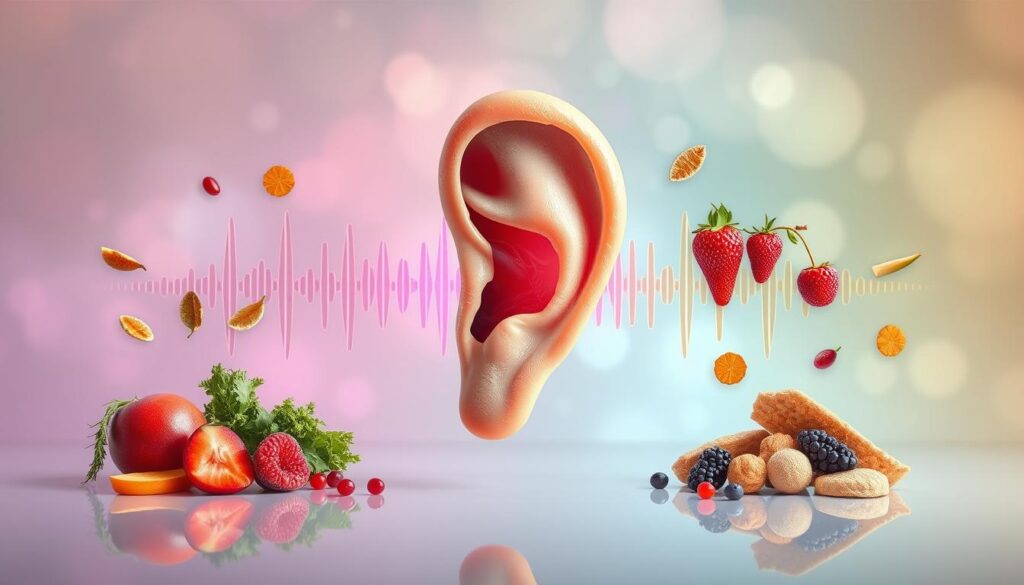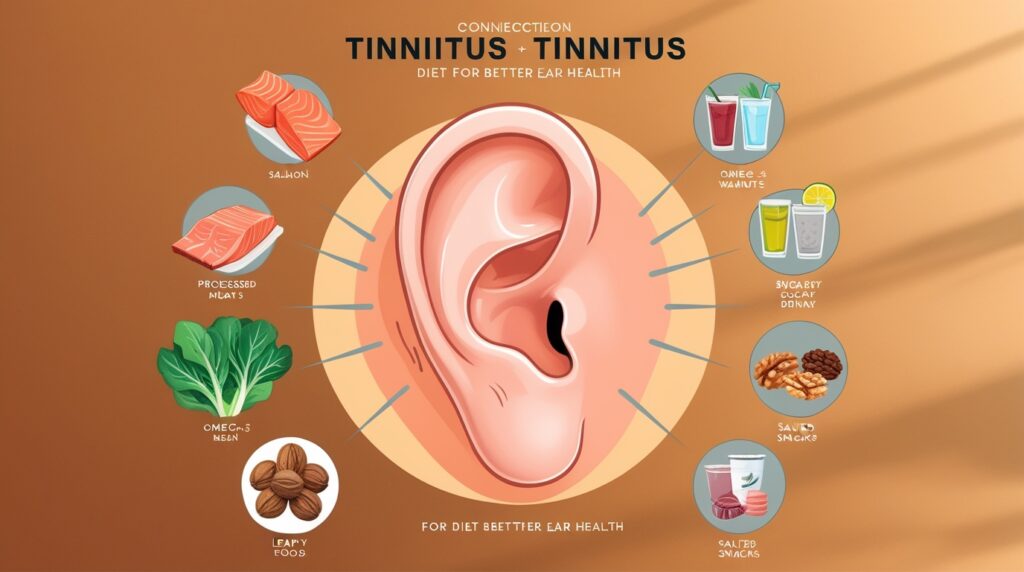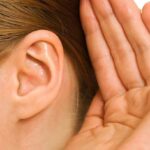How Diet Affects Tinnitus: Foods to Eat and Avoid for Better Ear Health and Reducing NOISE or Ringing in the Ears If you’re one of the millions of Americans struggling with tinnitus, your diet might be helping manage your symptoms. Tinnitus, a common auditory disorder is frustrating and disruptive. But research shows that changing your diet could help.
We’ll look into how diet affects tinnitus. We’ll find out which foods and nutrients can help. You’ll learn about vitamins and minerals and what foods to avoid. This will help you manage your tinnitus through your diet.
Key Takeaways
- Certain nutrients like vitamin B12, vitamin D, and protein may be associated with reduced tinnitus risk
- Processed foods, high-fat and high-salt diets, and excessive consumption of caffeine and alcohol can exacerbate tinnitus symptoms
- Anti-inflammatory foods like berries, leafy greens, and fatty fish may help alleviate tinnitus by improving blood flow and reducing inflammation
- Maintaining adequate levels of vitamins B1, B2, B3, B6, B12, and minerals like zinc and folate can support ear health and tinnitus management
- Developing a personalized, tinnitus-friendly diet can be a valuable first step in addressing the underlying causes of your condition.
What is Tinnitus and Its Causes?
Tinnitus is a condition where you hear sounds like ringing, buzzing, or hissing in your ears. These sounds have no real source. In the United States, about 50 million people suffer from chronic tinnitus for more than six months.
For a quarter of these people, tinnitus is severe enough to disrupt their daily lives. It’s more common in men and gets worse with age.
Definition and Prevalence of Tinnitus
Tinnitus is described as a ringing, roaring, or buzzing sound in your head. It affects up to 1 in 4 adults. About 15 percent of adults over 18 have some hearing trouble.
Common Causes of Tinnitus
The exact reasons for tinnitus are not fully understood. It’s often linked to hearing loss, which can be caused by noise, age, or medical conditions. Ménière’s disease, a chronic inner ear disorder, can also cause tinnitus.
Other possible causes include nerve damage, allergies, blood pressure issues, tumors, diabetes, thyroid problems, head injuries, medication reactions, wax buildup, and jaw problems.
While there’s no cure for tinnitus, treatments like hearing aids, cochlear implants, and therapy can help manage symptoms. A thorough diagnosis involves a complete history, physical exam, and audiological evaluation.
The Potential Role of Diet in Tinnitus
Research suggests that diet might play a role in tinnitus symptoms. Some studies found links between certain foods and tinnitus. For example, avoiding dairy and eating more fruits and vegetables might help. On the other hand, eating fish and fewer eggs could reduce tinnitus. You can also explore solutions like this tinnitus treatment that promises no more whooshing, buzzing, or clicking, as well as 20/20 hearing and improved brain function.
Research on Dietary Factors and Tinnitus Symptoms
Tinnitus affects millions worldwide. Some research points to dietary factors as a possible cause. Caffeine, found in coffee and soft drinks, can make tinnitus worse for some. Alcohol and high salt intake might also trigger tinnitus.
There’s no single “tinnitus diet” that works for everyone. Dehydration can make tinnitus worse, so staying hydrated is key. Working with healthcare providers who know about nutrition and tinnitus is helpful. Avoiding fad diets is important, as they can be harmful.
Research on food and tinnitus is ongoing. More studies are needed to provide clear guidelines.
Recent studies have shed light on nutrients and tinnitus. A UK study found that vitamin B12 might lower tinnitus risk. However, calcium, iron, and fat might increase it. High protein diets were also linked to lower tinnitus risk.
In Italy, a study found that moderate caffeine or butter intake could reduce tinnitus risk. Diets rich in poultry, prosciutto, and legumes were also beneficial. People with varied diets had a lower risk of persistent tinnitus.
While some research hints at a link between diet and tinnitus, more is needed. Treatments include addressing earwax, jaw problems, and using sound therapies. Fasting claims are not supported by current research, highlighting the need for more study.
For further support in managing tinnitus, explore this solution designed to help alleviate symptoms and improve ear health.
Foods and Nutrients Potentially Linked to Tinnitus
Research is ongoing to see how diet affects tinnitus. But, some foods and nutrients might be linked to it. It’s worth looking into.
Caffeine and Tinnitus
There’s a lot of talk about caffeine and tinnitus, but the science is not clear. A study in Italy found that drinking a lot of caffeine might help prevent tinnitus. But, the American Tinnitus Association says there’s not much proof that caffeine makes tinnitus worse.
How caffeine affects tinnitus can differ for everyone. So, it’s up to each person to see how it impacts their symptoms.
Alcohol and Tinnitus
Like caffeine, there’s not much solid evidence that alcohol affects tinnitus. If you don’t notice a connection between drinking and tinnitus, you might not need to cut back. But, drinking less can still be good for your health.
Salt and Tinnitus
There’s a strong link between salt and Ménière’s disease, which can cause tinnitus. Dehydration can also make tinnitus worse. But, there’s no clear proof that salt directly causes tinnitus, unless it’s related to Ménière’s disease.
Even though research is still growing, eating a balanced diet might help with tinnitus symptoms. Getting advice from a healthcare provider who knows about nutrition and tinnitus is a good idea. But, be careful of quick fixes or fad diets. They can do more harm than good in managing tinnitus.
Tracking Your Diet and Tinnitus Symptoms
While research on diet and tinnitus is ongoing, some people notice a link between what they eat and their tinnitus. Keeping a tinnitus symptom diary can help understand this connection better.
In your diary, write down when and how bad your tinnitus is. Also, note any factors that might affect it, like stress or certain foods. This way, you might spot patterns that help manage your tinnitus.
After filling out your diary, show it to your doctor or audiologist. They can look at it and suggest diet changes or other ways to ease your symptoms.
Even though research is still out, tracking your diet and tinnitus can be helpful. It’s a good way to see if your food choices affect your tinnitus and ear health.

Keeping a tinnitus symptom diary and watching your diet can give you useful info for your doctor. This can help you find ways to better manage your tinnitus. It’s a step towards improving your ear health and finding relief from tinnitus symptoms.
Nutrients Associated with the Risk of Developing Tinnitus
Recent studies show that some nutrients in your diet might raise tinnitus risk. A 2018 study found that not getting enough vitamin B2, B3, water, and protein could lead to tinnitus. But, a 2020 study found that eating more protein might lower tinnitus risk. It also found that too much calcium, iron, and fat could increase the chance of getting tinnitus(NOISE or ringing in the ears).
Vitamin B12 deficiency is also linked to tinnitus risk. Lack of this vitamin can make you more likely to hear ringing or buzzing sounds. Eating foods rich in fruits, vegetables, and lean proteins can help keep your ears healthy and might lower tinnitus risk.
Even though research is ongoing, the link between nutrients and tinnitus is still not fully understood. More studies are needed to grasp how diet affects tinnitus. Still, eating a balanced diet full of nutrients is good for your ears and might help prevent tinnitus(NOISE or ringing in the ears).
In short, while research is still growing, some nutrients like vitamin B12 and protein might influence tinnitus development. Eating a variety of whole foods can help prevent tinnitus and keep your ears healthy.
noise or ringing in the ears
Tinnitus is a condition that causes a persistent noise or ringing in the ears without an external source. People often hear sounds like ringing, buzzing, hissing, or whistling. This condition affects up to 1 in 4 adults and is often linked to hearing loss(NOISE or ringing in the ears).
Tinnitus can greatly affect a person’s life, causing fatigue, stress, and sleep problems. It can also lead to memory issues, depression, anxiety, headaches, and problems at work and home. While there’s no cure, managing the condition can help reduce symptoms.
Loud noises from heavy equipment, firearms, or music players can cause hearing loss and tinnitus. Age, obesity, cardiovascular issues, high blood pressure, and head injuries can also increase the risk. Using hearing protection and limiting loud sounds can help prevent tinnitus.
There are no specific medications for tinnitus. However, sound therapy can help by changing brain neural changes caused by hearing loss. Along with dietary changes, consider this tinnitus treatment to experience relief from symptoms(NOISE or ringing in the ears).
Understanding tinnitus causes and management can help improve quality of life. It’s important to take proactive steps to address this condition.
Dietary Patterns and Tinnitus
Research on foods and tinnitus is still in its early stages. However, studies have looked at how different diets affect tinnitus risk. A 2020 study found that eating a lot of protein might lower tinnitus risk. Another study from 2013 showed that eating healthy, as measured by the Healthy Eating Index, could reduce tinnitus risk(NOISE or ringing in the ears).
This suggests that a balanced diet might help manage or lower tinnitus risk. Even if we don’t know the exact impact of each food item(NOISE or ringing in the ears).
Healthy Eating Patterns and Tinnitus Risk
Eating a diet rich in protein and low in fat and sodium might help with tinnitus. Foods like fruits, vegetables, and lean proteins could lower tinnitus risk. On the other hand, diets full of processed foods, sodium, and unhealthy fats might raise it(NOISE or ringing in the ears).
It’s also key to get enough vitamin B12, as a lack of it can increase tinnitus risk(NOISE or ringing in the ears).
While a healthy diet can help, it’s not a guarantee against tinnitus. Protecting your ears from loud noises is also vital for ear health and tinnitus management. More research is needed to fully grasp the link between diet and tinnitus. But, the current evidence supports the role of a balanced diet in tinnitus management.(NOISE or ringing in the ears)
Conclusion
While research on diet and tinnitus is still growing, some links have been found. Certain foods and eating habits might affect tinnitus. Nutrients like vitamin B12 and protein could either help or harm. Eating lots of fruits, veggies, whole grains, and lean proteins might also help.
But, we need more studies to really know how diet impacts tinnitus. People with tinnitus can try keeping a food diary to see if they notice any patterns. They should also talk to doctors to find the best ways to manage their tinnitus. This might include stress reduction, therapy, and using hearing aids(NOISE or ringing in the ears).
For additional relief, consider using this tinnitus solution, which promises no more whooshing, buzzing, or clicking sounds. By working with healthcare providers and keeping a food diary, you can better understand how your diet affects tinnitus and take proactive steps to manage your symptoms effectively(NOISE or ringing in the ears).
FAQ
What is tinnitus and how common is it?
Tinnitus is a condition where you hear sounds like ringing or buzzing in your ears. These sounds have no real source. It affects up to 1 in 4 adults, making it quite common(NOISE or ringing in the ears).
What are the common causes of tinnitus?
Tinnitus’s exact causes are still unknown. But, it’s often linked to hearing loss. This can be due to loud noises, aging, or certain health issues. It can also be a sign of Ménière’s disease, a chronic ear disorder.
Is there a link between diet and tinnitus?
The connection between diet and tinnitus is not fully understood. Yet, some studies suggest that diet might play a role. For example, avoiding dairy and eating more fruits and vegetables might help. Whole-grain bread intake has also been linked to tinnitus symptoms(NOISE or ringing in the ears).
How does caffeine, alcohol, and salt affect tinnitus?
There’s ongoing debate about caffeine and tinnitus, but solid evidence is lacking. Alcohol’s impact on tinnitus is also unclear. However, salt intake is strongly linked to Ménière’s disease, which can cause tinnitus(NOISE or ringing in the ears).
How can I track my diet and tinnitus symptoms?
To explore the diet-tinnitus connection, start a symptom diary. Note the date, time, and severity of your tinnitus. Also, record any factors that might affect your symptoms, like stress or environmental changes. This can help you spot patterns and discuss them with a healthcare professional(NOISE or ringing in the ears).
What nutrients are associated with the risk of developing tinnitus?
Some studies suggest certain nutrients might influence tinnitus risk. For instance, low levels of vitamin B2 and B3, water, and protein might increase the risk. On the other hand, higher protein intake could lower the risk, while calcium, iron, and fat might increase it.
How do dietary patterns affect the risk of tinnitus?
The research on specific foods and tinnitus is limited. However, some studies look at dietary patterns. A 2020 study found that a diet rich in protein might reduce tinnitus risk. A 2013 study also linked a healthier diet to lower tinnitus risk(NOISE or ringing in the ears).
For further help managing tinnitus, explore this tinnitus solution, designed to alleviate symptoms and improve overall hearing health(NOISE or ringing in the ears).
Source Links
- Relationship Between Diet, Tinnitus, and Hearing Difficulties – https://www.ncbi.nlm.nih.gov/pmc/articles/PMC7664714/
- How Your Diet Can Help Cure Tinnitus | MetroHearing – https://www.metrohearing.com/blog/what-foods-help-heal-or-reduce-tinnitus/
- Foods for Tinnitus: What to Eat and What to Avoid When You Have Tinnitus – https://www.neilsperlingmd.com/blog/2018/05/foods-for-tinnitus-what-to-eat-and-what-to-avoid-when-you-have-tinnitus/
- Patient education: Tinnitus (ringing in the ears) (Beyond the Basics) – https://www.uptodate.com/contents/tinnitus-ringing-in-the-ears-beyond-the-basics/print
- Tinnitus – https://www.hopkinsmedicine.org/health/conditions-and-diseases/tinnitus
- The Role of Diet and Lifestyle in the Tinnitus Management: A Comprehensive Review – https://www.ncbi.nlm.nih.gov/pmc/articles/PMC11137645/
- Uncovering the Connection between Tinnitus and Your Diet – Heartland Hearing Center – https://heartlandhearingiowa.com/uncovering-the-connection-between-tinnitus-and-your-diet/
- Fasting for tinnitus: Benefits, risks, and other treatment options – https://www.medicalnewstoday.com/articles/fasting-for-tinnitus
- The Role of Diet in Tinnitus Onset: A Hospital-Based Case-Control Study from Italy – https://www.ncbi.nlm.nih.gov/pmc/articles/PMC9920666/
- Foods that trigger tinnitus: Can diet make it worse? – https://www.medicalnewstoday.com/articles/foods-that-trigger-tinnitus
- Dietary Fibre Intake and the 10-Year Incidence of Tinnitus in Older Adults – https://www.ncbi.nlm.nih.gov/pmc/articles/PMC8622838/
- Diet Could be Closely Tied to Your Tinnitus Symptoms – https://www.hearcareinc.com/new-research-connects-tinnitus-to-diet/
- Diet Could be Closely Linked to Your Tinnitus Symptoms – https://www.imaginears.com/tinnitus-articles/new-research-connects-tinnitus-to-diet/
- Tinnitus – Symptoms and causes – https://www.mayoclinic.org/diseases-conditions/tinnitus/symptoms-causes/syc-20350156
- What Is Tinnitus? — Causes and Treatment – https://www.nidcd.nih.gov/health/tinnitus
- Your Tinnitus Symptoms May be Brought About by Your Diet – https://www.audiologyassociates.com/tinnitus-articles/new-research-connects-tinnitus-to-diet/
- Your Tinnitus Symptoms Could be Triggered by Your Diet – https://www.hear-virginia.com/tinnitus-articles/new-research-connects-tinnitus-to-diet/
- Tinnitus – StatPearls – NCBI Bookshelf – https://www.ncbi.nlm.nih.gov/books/NBK430809/
- Why You Have Tinnitus – https://www.webmd.com/a-to-z-guides/tinnitus-triggers
- Tinnitus: Characteristics, Causes, Mechanisms, and Treatments – https://www.ncbi.nlm.nih.gov/pmc/articles/PMC2686891/



